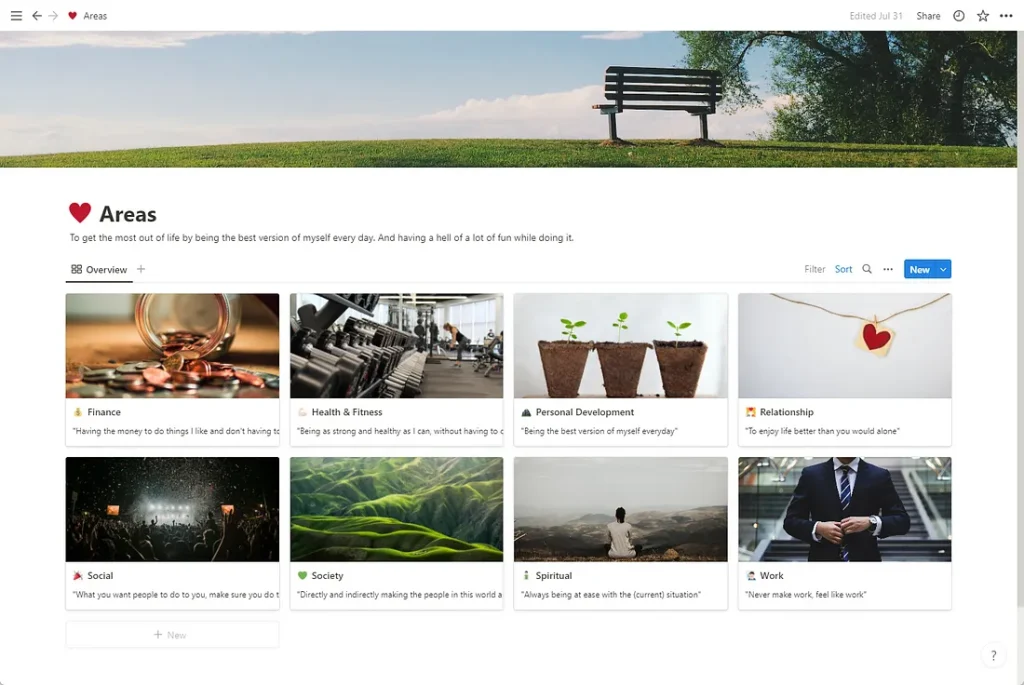
I’m guessing, since you’ve clicked the link, you’re — like me — interested in living a life with purpose and in line with your core values. Like me, you want to make the best use of the limited time we have on this planet and like me, you at times realize that you haven’t done the things that you’ve truly wanted to do. Be it spending too much time at work, while you wanted to hit the gym or hang out with friends, trying not to think about how you’d rather want to do something else in your career.
This article is not going to solve that for you.
What I can do, is show you my way of trying to live a purposeful life. Give a glimpse of how I reflect on the things that I truly value in life and use those to inspire action.
What you will read if you continue
- How I turn my core values into concrete actions.
- How I use recurring moments of reflection to keep me on track.
- How I use Notion to help me structure this system.
The guiding principles
- It should help me focus on my core values.
- It should give a (rough) overview of if I’m moving towards or away from my long-term goals.
- It should help me to inspire action throughout my day-to-day life.
“Goals are about the results you want to achieve. Systems are about the processes that lead to those results.”
— Atomic Habits, James Clear
The system
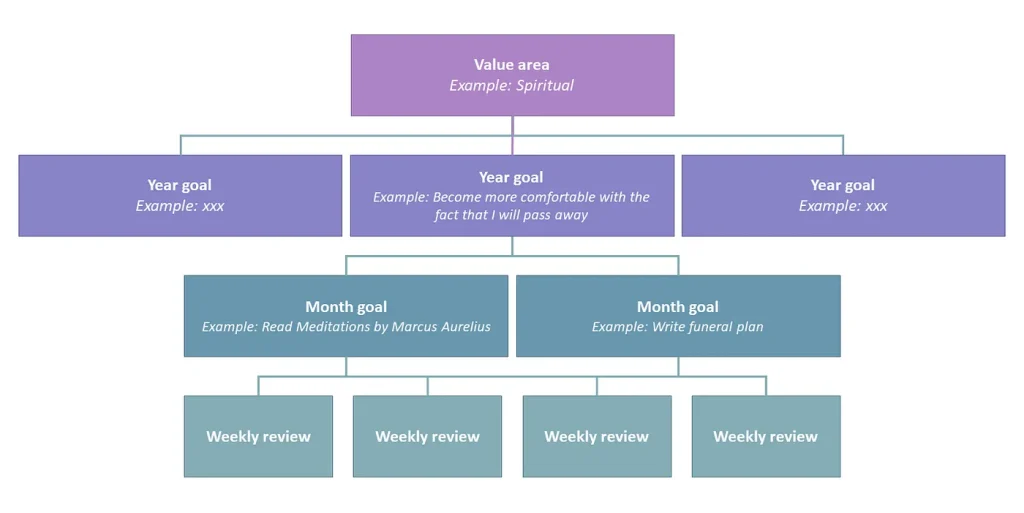
1. Value areas
The starting point of the system is the value areas. These are the areas in my life that I’ve identified as important to me. These are (currently): Finance, Health & Fitness, Personal Development, Relationship, Social, Society, Spiritual and Work. For each of these areas, I’ve written down the answers to the following questions:
- Why this area? eg Why work? Why have friends?
- What is this area to me? eg What is spirituality to me? What is my role regarding the rest of society?
Where applicable I drilled down with more specific questions such as ‘What kind of role does my fitness play in my life? How do I balance this with enjoying other things such as food and drinks?’ Inspiration taken from these questions is taken from the book Designing Your Life by Bill Burnett and Dave Evans.
Finally, I also add a one-liner in which I try to summarize the value.
💻 Setting it up in Notion
- Create a database called ‘Areas’
- For each Area created a Page
- Add Toggle Headings on the Page for the sections: Vision, Year Goals (more on this below) and Notes
2. Year goals
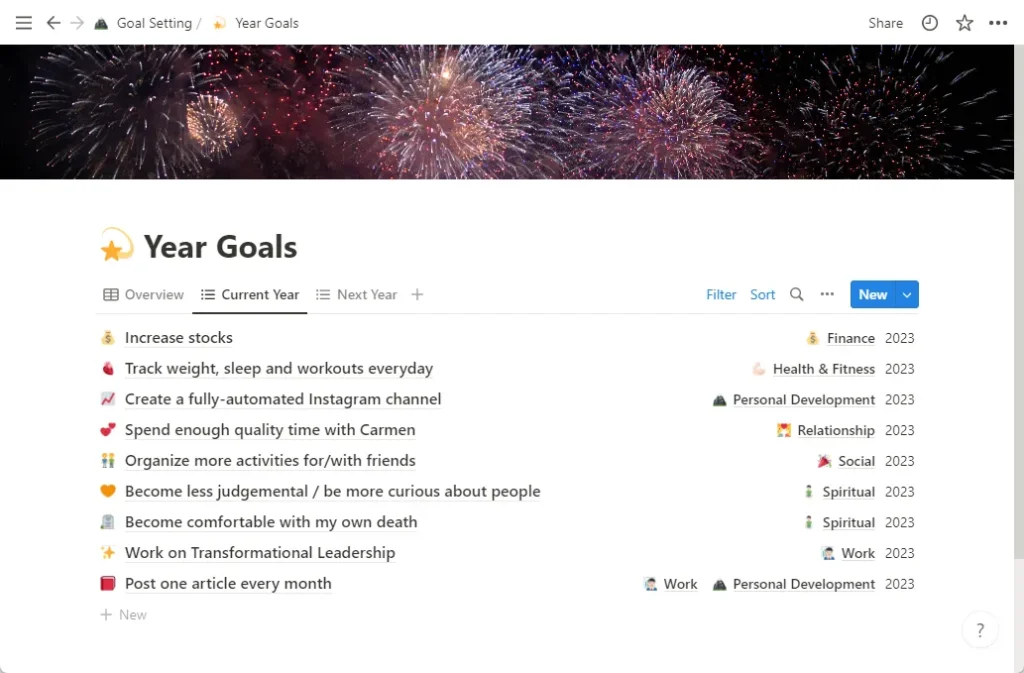
Let’s move on to the next step in the system: year goals. Where the previous step is somewhat more high-level — philosophical even -, the year goals are already way more concrete. Throughout the year I collect ideas about things that I want to learn, for example:
- Learn how to market a product.
- Expand my coding skillset.
- Grow into an inspiring manager.
In December of every year, I block some time in my calendar to do a year reflection and set my goals for the upcoming year. My preferred way is to spread it into chunks of a couple of hours throughout the month, but a full day would also work. Anthony Gustin has made a great template for this. When going through the goals I’ve written down throughout the year, this is the time to make them more concrete. For example, I want to become better at coding, as well as learn how to build a brand, so a set the goal of creating a fully automated Instagram channel.
Pro-tip: stuck with making a goal more actionable/S.M.A.R.T.? Throw your goal into ChatGPT with a prompt like ‘how can I make [goal] more actionable?’, ‘what can I do to achieve [goal]?’ or ‘what are some great resources to achieve [goal]?’ and let yourself be inspired.
Next, each of these goals gets linked to their respective areas. Some match multiple, some only one. After linking all of these, I review which Areas have a lot of goals and which have none or very little. Where needed, I create or remove goals. My target is to have 1 or 2 year goals per Area.
💻 Setting it up in Notion
- Create a database called ‘Year Goals’
- Add a Relation property to the Areas database
- Add a Date property to set the start and end of the year
- Add a Formula field called ‘Year’ and the formula ‘formatDate(end(prop(“Date Range”)), “YYYY”)’ to filter the year (this can be used for creating views)
- Add any notes, resources or ideas about the goal on the Page of the note
- (Optionally) For each Area, add on the page under the toggle heading ‘Year Goals’ a view to the ‘Year Goals’ database and filter those on the Area and group on year
3. Month goals
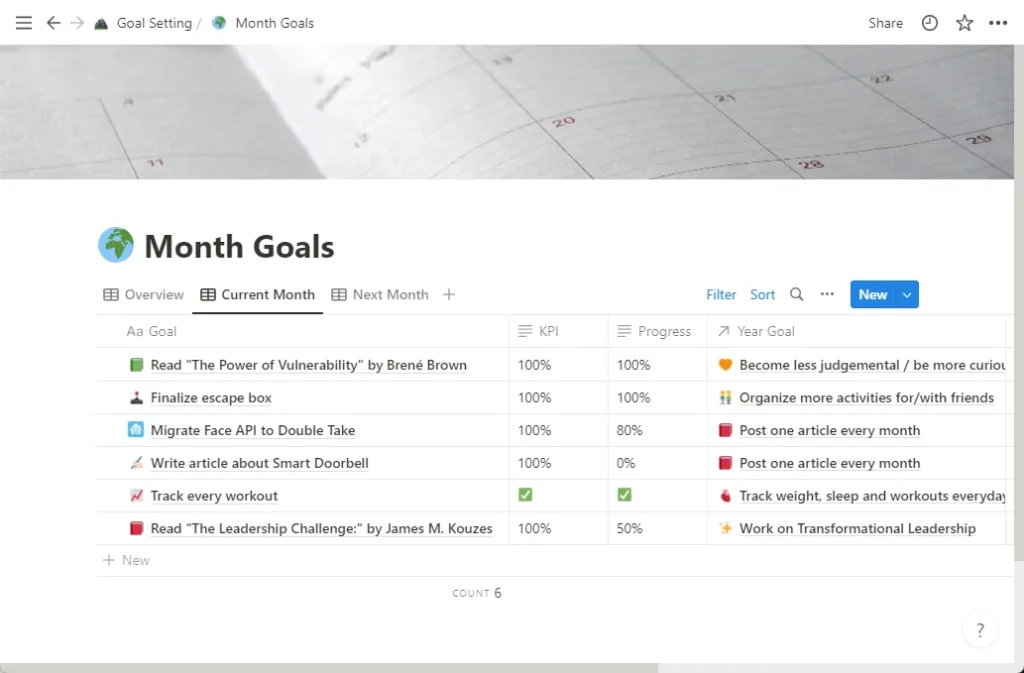
So, values? Check. Goals? Check. We’re good to go! Well.. due to the ‘size’ of year goals, it helps (me) to break down these goals into smaller goals per month. This has two benefits:
- Breaking big goals up helps in setting intermediary results and thus small wins 🎉
- By setting these goals every month, there is a natural point in time to reflect on your progress towards said goal.
Note that not every month should one goal for every goal of that year, to ensure focus. By setting aside every time every month to create new goals (I have set a Todoist reminder for every last Sunday of the month), you can take the time to see what year goals require your attention.
💻 Setting it up in Notion
- Create a database called ‘Month Goals’
- Add a Relation property to the Year goals database
- Add a KPI and Progress Text property (this can be a Number as well)
- Add a Date property to set the start and end of the month
- Add a Formula field called ‘Year’ and the formula ‘formatDate(end(prop(“Date Range”)), “MMMM YYYY”)’ to filter the year (this can be used for creating views)
- Add any notes, resources or ideas about the goal on the Page of the note
4. Weekly review
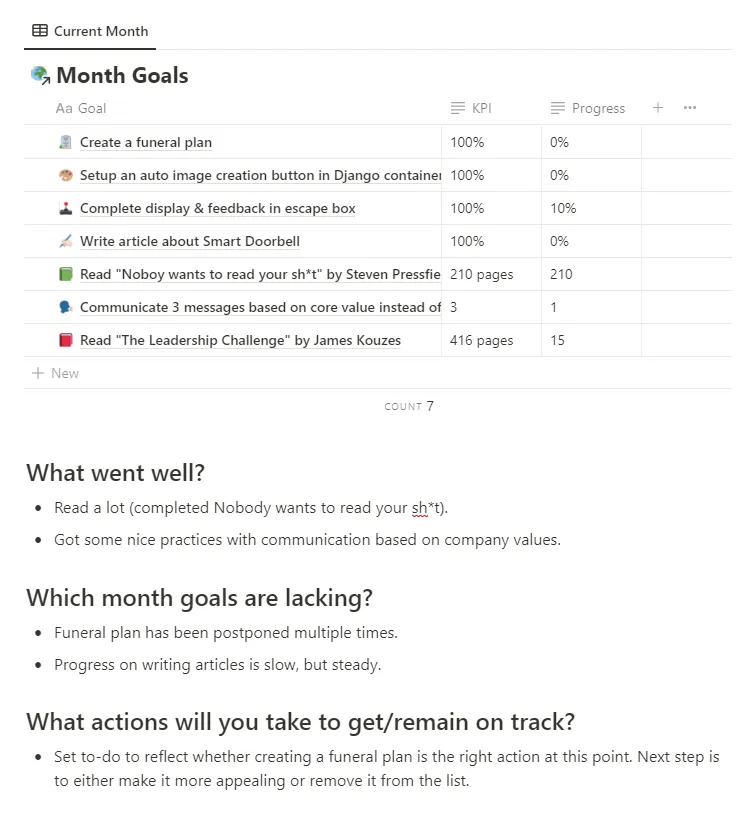
During the weekly review is where it all comes together. For those familiar with Agile SCRUM, this is like my own personal mini-retrospective. The goal is to question yourself on what went, what didn’t go so well and what (small) next step needs to be taken to get me on track again.
Honesty is key here. Since I’m doing this just for myself, I don’t have to come up with excuses. If I notice a goal has not been picked up or postponed multiple times, it is time to reflect on whether this is the right goal at the right time. A great resource I’ve used for this is the book Atomic Habits by James Clear. My approach is ‘firm but pragmatic’: of course, the focus should be on reaching the goal. But if you consistently can’t be motivated by a goal you have set out for yourself, then apparently this is not the way to go.
I like these reviews since they are a perfect ‘check your compass’ type of action. By weekly validating if I’m still on track and adjusting where needed, goals become easier to maintain and follow.
💻 Setting it up in Notion
- Create a ‘Weekly review’ database
- Create a ‘Weekly review’ template in that database
- Add a Date property to set the current week
- Add a Formula field called ‘Week’ and the formula ‘formatDate(prop(“Created”), “w”)’ to see what the current week is
- Add an inline database view that filters on the goals of the Current Month (eg Filter is “Where [Date Range] [is relative to today] [past] [1] [month]”
- Add the questions: “What went well?”, “Which month goals are lacking?” and “What actions will you take to get/remain on track?” to the template
Conclusion
If you just take one thing from this: I enable myself to live a more purposeful life, by making sure to know my core values and reflect periodically on whether I’m living up to those. I believe this might help you as well. Yes, it takes time to do this, but less than you might think.
Please let me know in the comments if you have any questions, where you (dis)agree or what your approach is to living a purposeful life. Thanks for taking the time to read this and wishing you all the best!
Resources
“If I have seen further, it is by standing on the shoulders of Giants” — Isaac Newton
This system has taken a lot of inspiration and input from others. Some great resources I recommend:
Designing Your Life — Bill Burnett, Dave Evans
- Great exercises to get insight into your core values
The 7 habits of highly effective people — Steven Covey
- Start with the end of mind is the inspiration why I’m starting with
Getting Things Done — David Allen
Four Thousand Weeks — Oliver Burkeman
- Great book about how we shouldn’t be more efficient, but more life more purposeful.
- Highly recommended book on setting behaviour-changing goals. It describes the ‘Four Laws of Behaviour Change’: (1) make it obvious, (2) make it attractive, (3) make it easy, and (4) make it satisfying.